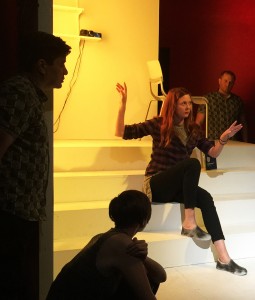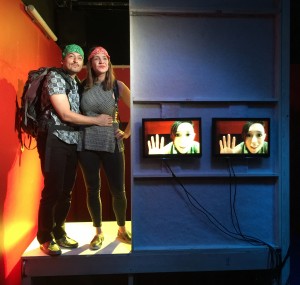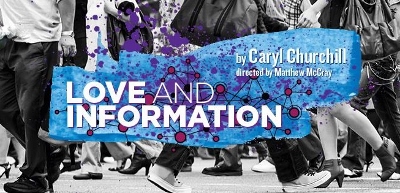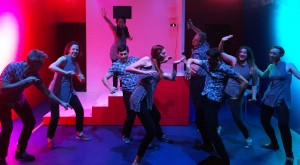TMI AOK
I’m a librarian during the day, and one thing I remember from back in Library School (because you have to go to Library School to become a librarian, you know) is that there are many discussions about the nature of information. Oh, librarians are fascinated about information.
To a specialist in such things, information is itself just an object of quantifiable amount–a recipe, your favorite song, the name of the medicine that you need for your heartburn–which turns into knowledge when it passes from its source to its recipient. There are numerous theories that exploit the permutations and various alternate interpretations of information into knowledge.
 This is, of course, intrinsically fascinating stuff–if you’re a librarian. To the rest of you, well, it could possibly be less than compelling. And, upon learning that this fairly recent play by Caryl Churchill is about the nature of information, one might evince a bit of nervousness. How do you make a delightful play about the nature of information?
This is, of course, intrinsically fascinating stuff–if you’re a librarian. To the rest of you, well, it could possibly be less than compelling. And, upon learning that this fairly recent play by Caryl Churchill is about the nature of information, one might evince a bit of nervousness. How do you make a delightful play about the nature of information?
Well, Churchill’s method in Love and Information is to craft a quick expressionistic collection of vignettes, some no more than a few lines, that quickly sketch a situation before the piece moves on to another scene with different characters. The impression the work leaves is somewhere between a set of very short one-act plays and what happens when you’re flipping the TV channel late at night. If you don’t like a scene, wait a few seconds and there will be a different one.
A trio of teenage girls cyberstalk a rock star, learning information about him from the Internet. A group of male teens joke about the idea that famous events are all captured on video and wonder what it would have been like if events such as the Revolutionary War had been broadcast. On a talk show, a gentleman with a photographic memory exhibits that he can remember every moment of his day, albeit with tragically little emotional affect. A man falls in love with a beauty who only exists in virtual reality and cannot be convinced that she isn’t real.
A look at the script (a portion of which is provided in the press materials) demonstrates director Matthew McCray’s astonishing creativity. The piece is laid out like poetry, with each vignette possessing its own individual title. There’s no structure and the writing looks like an anthology of song lyrics. It’s only with the  parts being assigned and developed by the ensemble that the piece shifts from densely ambiguous poetry to a play. The artistry here is in the elevation from text to theatrical experience.
parts being assigned and developed by the ensemble that the piece shifts from densely ambiguous poetry to a play. The artistry here is in the elevation from text to theatrical experience.
The cast is deft and it’s really quite amazing how the performers are able to develop a few brisk lines into full-on scenarios (many aspects of which are not seen by the audience, since each piece is so short). However, ironically, it’s the staging of Churchill’s poetic writing that actually has the effect of diminishing the material into rather prosaic skits. What’s a puzzle on the page turns into lightweight meditations on the work’s overall theme of our relationship to information.
The performers adroitly juggle a variety of roles. Particular standouts are Alexander Wells as a technology-shunning granddad living in an isolated off-the-grid cabin; Melina Bielfelt as a woman trying to prove to her husband, who has suffered a memory loss, that she’s his wife; and Richard Azuria as a thug preparing to interrogate a prisoner in another room.
photos by Mainak Dhar
Love and Information
Son of Semele Theater
3301 Beverly Blvd. (@ Hoover)
Fri and Sat at 8; Sun at 5
Mon (Nov. 16 and Dec. 7) at 7
ends on December 13, 2015
for tickets, visit www.sonofsemele.org


